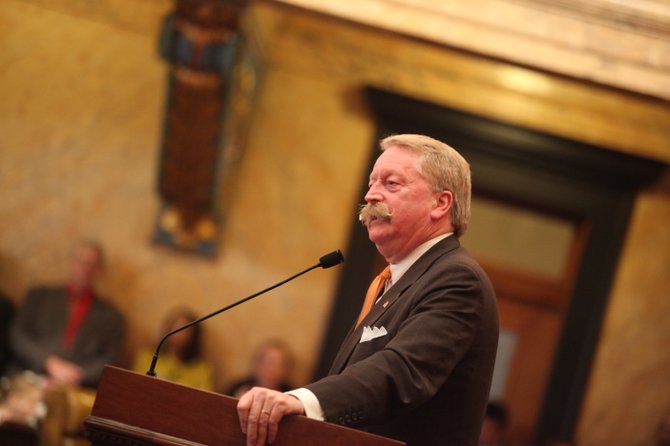House Ways and Means Chairman Rep. Jeff Smith, of Columbus, said the Senate did not wish to provide Jackson State any stadium funds this year. Smith said the leadership of the House and Senate taxing committees would meet with Jackson State officials this week. Photo by Courtesy Amile Wilson
Some lawmakers are decrying the absence of funding for a new Jackson State University football stadium in the $196.4 million bond package that Mississippi House and Senate budget negotiators worked out.
The bond bill, Senate Bill 2913, contains a laundry list of capital projects around the state. This sum includes $11.3 million for Jackson State for repairs to the Margaret Walker Alexander Center and the school of education, and for furniture at a building JSU owns in downtown Jackson, 101 Capitol Centre.
The bill does not contain any funds for the proposed 50,000-seat state-of-the-art domed stadium that JSU envisions will accommodate football and basketball games as well as serve as a big-name concert venue.
This morning on the House floor, Democrats, including some members of the Legislative Black Caucus who graduated from Jackson State, pressed the Republican leadership on the lack of stadium funding.
"It's a very storied athletic program, and they deserve to have a stadium on their campus," said Rep. Rufus Straughter, D-Belzoni, a JSU alumnus.
House Ways and Means Chairman Rep. Jeff Smith, of Columbus, said the Senate did not wish to provide Jackson State any stadium funds this year. Smith said the leadership of the House and Senate taxing committees would meet with Jackson State officials this week.
"Let's quit giving people false hope. Let's quit prevaricating," Smith said, although when pressed by a House member, he declined to identify any prevaricators.
"There's nothing in here for Jackson State, but I'm not going to say there's no hope for Jackson State," Smith said.
Smith added that the Mississippi State Fairgrounds also would not receive any funds in the bond bill.
The bill passed the House by a vote of 109-5 just before noon. Eric Stringfellow, JSU communications director, declined to comment for this story.
Over the Easter weekend, the Legislature did arrive at a $5.6 billion budget, formalized this past week, that provides modest increases in some line items that had become the focus of intense debate.
The spending plan for the 2014 fiscal year is about 2 percent more than the current fiscal year budget. Lawmakers added $48.6 million for public K-12 schools, mostly to cover rising teacher pensions and for literacy coaches for Gov. Phil Bryant's proposed third-grade reading improvements. Those two items, $25 million and $15 million respectively, represent the bulk of the extra money. The Mississippi Adequate Education Program formula, which is supposed to determine the amount of funding the state provides to school districts, will get just over $2 billion. MAEP remains $300 million in the red.
Republicans, who control both houses as well as the governor's office, say they would like to resume full funding of MAEP by 2016. Lt. Gov. Tate Reeves, said the agreement worked out by the House and Senate Appropriations Committee chairmen "keeps spending low as Mississippi's economy slowly recovers from the recession while dedicating more funds for priorities like strengthening the quality of education in Mississippi."



Comments